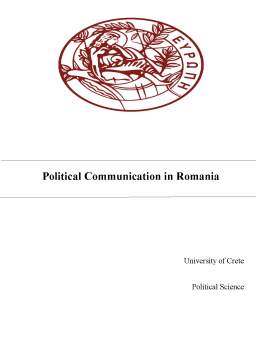Cuprins
- 1. Introduction
- 2. Sources of information in Romania
- 3. How democracy and mass-media work in Romania
- 4. Conclusion
- 5. Bibliography
Extras din referat
Introduction
Humans throughout their existence created various political entities that in nowadays represent the political history. Furthermore, politics means the study or practice of the distribution of power and resources within a given community (organized population) as well as the interrelationships between communities. Political entities have expanded from basic systems of self-governance and monarchy to the complex democratic systems that exist today. In most of the countries, we can say that people have formed political parties to put forward their ideas. There is usually some disagreement between people within a party, but they work together because they feel that they agree on enough things, and they will have more power if they join together. They agree to take the same position on many issues, and agree to support the same changes to law and the same leaders. An election is usually a competition between different parties. Throughout the twentieth century, the mass communication media were central to the dynamics of the relationships between governors and the governed in all types of political regime. So, the political system like any other system had to evolve along with the evolution of humanity and technology.
Politics and relations among individuals in societies across the world are being transformed by new technologies for targeting individuals and sophisticated methods for shaping personalized messages.This is concerned with how information spreads and influences politics and policy makers, the news media and citizens. The field of political communication concern 2 main areas:
• Election campaigns - Political communications involved in campaigning for elections.
• Government operations - This role is usually fulfilled by a Ministry of Communications, Information Technology or similar political entity. Such an entity is in charge of maintaining communication legislation and would be responsible for setting telecommunications policy and regulations as well as issuing broadcasting licenses, comments press releases
In the context of the relationship between the political actor, mass media and the public / electorate, the functions of Mass-Media are:
a) The politician broadcasts his “controlled speech” and has the possibility of presenting his point of view without being “interrupted” by the journalists, by his opponents, by the media format constraints.
b) The political opinions and posts broadcast in the traditional media - local and national - are replicated online. Thus, the political actor argues the visibility of his key messages delivered to a target group;
c) Due to the new media, the politicians launch a presumptive political and media agenda. Nowadays, it has become of common practice for the journalists to give visibility to some statements taken from the blogs or Facebook pages of the politicians. It was already created a symbiosis between the traditional media and the new media;
d) The governors use the new means of mass communication to promote their policies and the decisions they take and which give them the image of “good governors”;
e) The political doctrines, policies and electoral projects are promoted by the New Media, in a form other than the one in the traditional political communication. There are used publicly available forms – “interactive”, “narrative”, “conversational”.
f) The visibility of the electoral message - designing an alleged online electioneering is part of a candidate's electoral strategy, and each online resource has a specific function for his campaign;
g) By means of the Internet, there can be mobilized the voters who are asked to advance their opinion and to participate in the discussion on some issues of public interest.
h) By using the Internet, the political actor interacts apparently more “efficiently” with his voters, beyond the institutional and bureaucratic rigors.
Social media has dramatically changed the way in which modern political campaigns are run.
With more generation X and generation Y coming into the voting population, social media is the platform on which the politicians need to establish themselves and engage with the voters. In a digital age, social media will be more important than traditional media to the politicians.
Also, some parties/politicians can use the virtue of their “unconstrained and pervasive power” over their media systems, they can carefully structure the information they convey to the public through their “puppet” media, with the objective of forming and manipulating nonelite attitudes and behaviour.
Bibliografie
Sites:
https://en.wikipedia.org/wiki/2017_Romanian_protests
Books:
1. Antony Mughan and Richard Gunther (2000), Democracy and the Media - A Comparative Perspective, Cambridge University Press.
2. Active Watch - Media Monitoring Agency (2008). Assessment of the level of competence in the media, Bucharest.
3. Lecomte, P. (2004). Comunicare, televiziune şi democraţie [Communication, television and democracy]. București: Tritonic.
Preview document
Conținut arhivă zip
- Political communication in Romania.docx


















